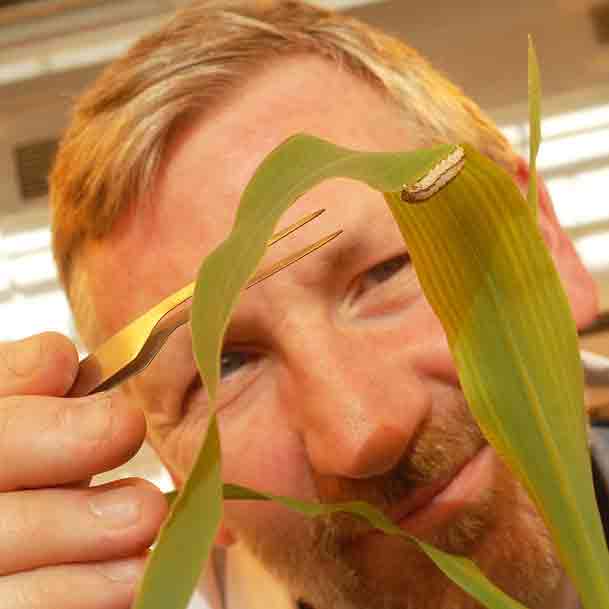Lancaster Researchers Discover Potential New Weapon Against African Crop Pests

A team of scientists has made a novel discovery that could provide a new strategy for controlling armyworms and other insect crop pests around the globe.
Crop pests such as the African armyworm are a major threat to global food security, especially in Africa and other parts of the developing world where chemical pesticides are too expensive for most resource-poor farmers. The African Armyworm is a voracious caterpillar pest which feeds on cereal crops, including staples such as maize, wheat, millet and rice, at densities of up to 50,000 caterpillars per hectare – sometimes resulting in total crop failure.
Researchers from Lancaster University, University of Greenwich and Tanzania (EcoAgriConsult Ltd.) have been investigating safe, affordable alternative control measures to tackle the caterpillars, such as microbial biopesticides, that do not rely on expensive imported chemicals.
But an unexpected finding – inspired by recent research into mosquitoes - has opened the door to a new strategy which could multiply the effectiveness of these biopesticides.
In common with nearly three-quarters of all insect species, some African armyworms carry with them a small passenger, called Wolbachia. This intra-cellular bacterium has taken centre-stage recently because researchers discovered that when some insects, including mosquitoes, carry Wolbachia it protects them from viruses including the virus which causes the devastating human disease called dengue. Wolbachia-carrying mosquitoes have been released in northern Australia in an attempt to get the bacterium to spread through the local mosquito population so as to reduce dengue transmission in the area.
The discovery led the Lancaster-led research team to wonder if Wolbachia would have a similarly protective effect on African armyworms, potentially hampering the effectiveness of the biopesticides such as SpexNPV currently under development in Tanzania.
What the team discovered surprised them.
"Not only did Wolbachia fail to protect the armyworms against SpexNPV", said project leader Professor Ken Wilson from the Lancaster Environment Centre, "but populations carrying lots of Wolbachia also had much higher viral loads and more of these caterpillars died naturally of viral disease."
To confirm that the increased susceptibility to virus of Wolbachia-carrying armyworms was caused by the presence of the bacterium, Wilson and colleagues took the insects back to the laboratory in the UK. There, they used antibiotics to 'cure' some of the armyworms of Wolbachia and then infected them with virus. Remarkably, they found that Wolbachia-carrying armyworms were between 6 and 14 times more susceptible to SpexNPV than armyworms that had had their bacterial passengers removed.
SpexNPV - a baculovirus that naturally infects and kills the African armyworm - is ideal for use as a biopesticide in Africa because not only can it be produced cheaply and locally, but it only infects armyworm caterpillars, leaving beneficial insects, livestock and humans completely unharmed.
Dr Rob Graham, lead author of the Ecology Letters paper reporting these findings said: "This means that SpexNPV is likely to be particularly effective as a biopesticide when Wolbachia is at naturally high levels in the armyworm population."
According to another co-author of the study, David Grzywacz of the University of Greenwich, this discovery also opens up the possibility of manipulating the prevalence of the bacterium in the field via the mass-release of Wolbachia-carrying armyworms, though he also sounds a note of caution. He said: "Adult armyworm moths are highly migratory and disperse over vast areas of sub-Saharan Africa, so it will be a challenge to learn how best to exploit these novel findings for better control of African armyworm.”
However, not all major crop pests are as mobile as armyworm moths, and the team are optimistic that if similar results are replicated in other -crop pests, then the mass-release of Wolbachia-infected insects might turn out to be an important new tool in the fight to control pests that contribute to global food insecurity.
The 3 year research project was funded by the Sustainable Agriculture Research for International Development programme - a joint initiative by the UK’s Department for International Development and the Biotechnology and Biological Sciences Research Council.
References: Graham, R.I., Grzywacz, D., Mushobozi, W.L. & Wilson, K. Wolbachia in a major African crop pest increases susceptibility to viral disease rather than protects. Ecology Letters.